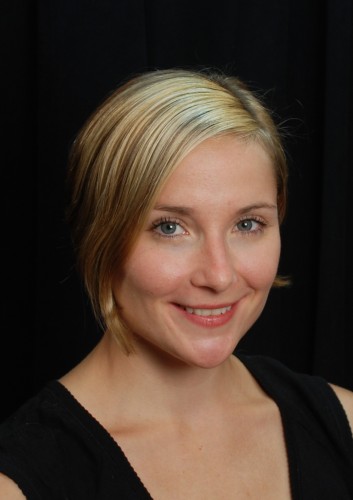
Over Aviations at Prime Meats, Sarah Deming talked with the enchanting Andrea Weber about her career in modern dance and the legacy of the great Merce Cunningham.
Sarah: When did you know you wanted to dance?
Andrea: At my first dance recital at age four. I was mad because I wasn’t the tallest so I didn’t get to be in the center of the line. I could tell the center was the best place to be. As I got older I realized what a hard life dancers had, and I tried to do other things, but dance was the place where I felt like myself. My dad and I made a deal that if I got into Juilliard, I would make a go of it, and I did!
Sarah: What attracted you to Merce’s work?
Andrea: A friend told me to take his class. I was resistant at first, because I thought it was unemotional. But I went, and I fell in love with the technique and with Merce. My body was suited to it. I was too tall for ballet, but Merce loved tall dancers. I felt an electricity – I loved taking on something so difficult.
Sarah: How do you deal with the perfectionism the work demands?
Andrea: Merce used to say that when you teach a class there should be something that everyone can do and something that no one can do. Sometimes he would ask us to do something absurdly difficult – jump, jump, jump, then hold a crazy position for twenty seconds – but he was always more interested in the trying than in the success. The wobbles were okay. Realizing this has been a huge breakthrough for me, not only in dance but also in life. Right now I am looking for the fragility in the work. I’m trying to focus on the path between points.
Sarah: What’s the view of gender in Merce’s work?
Andrea: I think he was very traditional. There is this clear message in the dance: Man supports woman. The main duet is almost always between a man and a woman, and it’s almost always tender. He was influenced by ballroom dance. I feel very female in Merce’s work.
Sarah: Do you think the work is difficult for audiences to understand?
Andrea: It’s only difficult if the audience thinks there is something to understand. There is no story. If you can let go and stop making it mean something, then you can have the experience. Merce created events. If people walked out, they walked out. I think he died okay with being misunderstood.
Sarah: He’s famous for choreographing dance that is independent of the music. How much attention do you pay to the music when you’re dancing?
Andrea: It depends. Sometimes I zone it out, and sometimes I’m deeply affected. I had this solo one night in Italy, and the first time I did it, the music was very loud and jazzy. The next night it was total silence. I remember thinking, “People can’t tell me this work isn’t emotional, because it’s emotional for me.”
Sarah: Do you see God in the operations of chance?
Andrea: I feel God’s presence in those moments when it all just works. I’m at peace with it not always being magical, but sometimes it is, and that keeps me going. I do feel that I was supposed to meet Merce and do his work of chance. Whether that’s God or not, I don’t know.
Sarah: What did Merce teach you?
Andrea: When I first joined the company, he put rocks in my hands, and he said, “Feel the weight in your arms when you dance.” I think I made him laugh. I always felt sort of goofy around him. The last time I saw him, a few of us visited him at home and we had just come from a Bollywood dance class. We did a dance for him while he lay there and he said, “I can see why that’s so popular. Bravo.” He was ready to make up new steps even on his deathbed. In a strange way, I feel like his passing has made things clearer for me. I’m one of the oldest dancers in the company now. Before he died I’d been considering retiring. But now I need to see it through the next two years.
Sarah: What happens after two years?
Andrea: The company will disband. Merce specified that we should do a Legacy Tour for two years, concluding with a show at the Armory on December 31, 2011 with $10 tickets. He also left instructions that the dancers be helped with their transitions. If his wishes are followed, this will set a precedent for how all dancers everywhere should be treated. Merce didn’t want the company to outlive his ability to create new works. It’s sad, but we have to move forward. As he always said, “It’s like putting one foot in front of the other.”
THE AVIATION
Crème de violette gives this cocktail a futuristic silvery color reminiscent of a Merce Cunningham unitard. Mixologist Damon Boelte says, “I’ve been lucky to have had quite a few Merce dancers at the bar. I think of this as their official cocktail.”
2 ounces Plymouth Gin
1/2 ounce Maraschino liqueur
3/4 ounce fresh lemon juice
2 dashes Crème de violette (optional but delicious)
Shake all ingredients very well over ice and strain into chilled cocktail glass. Garnish with a cherry. Beware: if you drink more than two, you may start to act avant-garde.

enjoyed andrea’s reminiscences of cunningham inspired by the good interviewer.